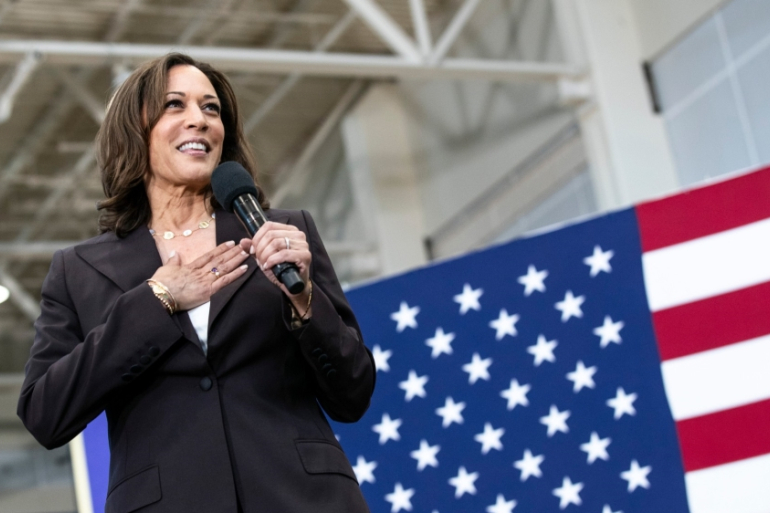First South Asian, Black, and female Vice President-elect Kamala Harris: Community Reacts
Megan Worry, freshman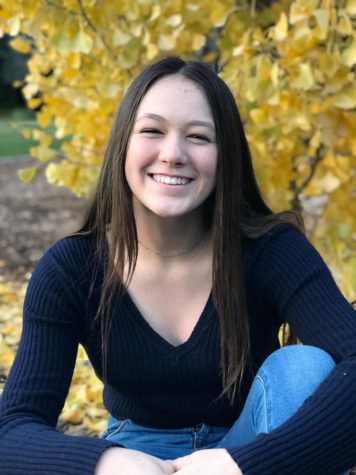
The Catalyst (TC): What does seeing a woman and a person of color in the vice presidential office mean to you?
Megan Worry (MW): It means that a lot of opportunities are open, not that they weren’t open before, but it is proving that women can do anything and be anything in any position. And that it takes a lot of work, but you can do it.
TC: What do you think is the value of representation of both gender and race in government positions?
MW: Well, I feel like it really brings a different perspective to the picture because half of the nation is women, and so to not have women as our leaders just misses that entire perspective on laws.
TC: At the end of her acceptance speech, Kamala Harris said that she would not be the last woman in this office. How do you find that these words and her achievements are inspiring to yourself or other young women around you to pursue leadership positions?
MW: Yeah, definitely. I feel like her showing that a woman can be a vice president shows that other women can do it and also become a president and other high leadership places.
TC: What new perspectives do you think that a woman can bring to the vice presidential office and the way that things are governed?
MW: By bringing the woman’s perspective to like how half the population lives. Especially with like all the debates on divorce, abortion, and stuff like that, I feel like men shouldn’t be the ones deciding. So, this kind of brings new ideas. Not that it wasn’t possible before but new perspective into politics because.
TC: If you had been able to vote, would the fact that a woman was on the ballot have influenced your voting decisions one way or the other?
MW: I mean, I think it would be a benefit, but I think I would vote for the person I would feel is most qualified, and if the woman’s perspective as part of my decision, then yeah.
Ashna Tumuluri, sophomore
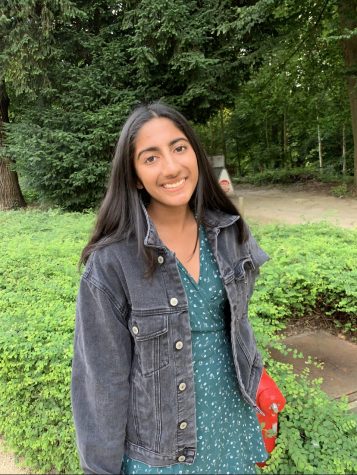
The Catalyst (TC): What does seeing a woman and a person of color and the vice presidential office mean to you?
Ashna Tumuluri (AT): I think I’ll see her as an inspiration. Seeing a Black, South Asian and female as a vice president is very inspiring and I think she’s paving the way for a lot of generations. Finally, I think this should have happened a long time ago but now that we have this, I think it’s really good for our country and we’re going to make a lot of progress by having the first female vice president, and South Asian and Black.
TC: What do you think is the value of representation of both gender and race in government positions?
AT: We live in a society that’s very, male dominated. Like equal pay, we don’t have that much right now, but right now it’s still an issue and I think having a female voice in the government, I think is great for our country because it’s representing what the females have to say.
TC: At the end of her acceptance speech. Kamala Harris said that she would not be the last woman in this office. Do you find that these words and her achievements are inspiring to yourself or other young women around you to pursue leadership positions?
AT: Yeah, I definitely do. I think seeing people as an inspiration really helps others and I think she’s right, she’s paving the way for others and she’s making history.
TC: Do you think that a woman will be able to bring new perspectives to the way that things are governed or managed?
AT: Yeah, absolutely. I think, like I said before, there’s no other female voice in this high of an office at the moment and she’s just representing what women have to say, so I think by her having this position, it’ll definitely help females, and I think it’ll just inspire people. I think having this is really inspiring for just the whole country, and women in general.
TC: If you had been able to vote this election, do you think that if the fact that a woman was on the ballot would have influenced your voting decisions, one way or the other?
AT: Yeah, I think it would have. Not only because she’s a woman, because of her political views, some of them I agree with. If I was to vote, I think, having her as a woman, it would show me that she’s representing me and my views. I guess her being a female is like, representation. And I think that would definitely affect it. Additionally, I agree with some of her political views too.
Emma Treanor, junior

The Catalyst (TC): What to see a woman and a person of color in the vice presidential office mean to you?
Emma Treanor (ET): I think it’s definitely not a point in history to be overlooked. And I think it’s amazing to have representation, and honestly I think that I haven’t grasped it very much yet. I feel like it’s going to hit me eventually. I think it’s really amazing to have representation, especially representation for people of color. I think that’s really overdue. We need women of color to be in office, and I think that this is a big step forward, although we do have to remember to keep people accountable. I do think that it’s a really interesting point in history to be living in.
TC: What do you think is the value of representation of both gender and race in government positions?
ET: Now, especially as the Black Lives Matter movement has been sort of increasing in its popularity, and when I say that, I think a lot of white people are actually learning more about the movement, and gaining new perspectives, which is really important. Because racism is continued through white people not through people of color, so I think that it’s really interesting, especially in this time, as people are becoming more aware that there is more representation, showing itself in governmental positions. And I think that there’s still a long way to go. We can’t just sit here and be happy having just one person representing a whole demographic, I think we should really work towards building out representation, but I think this is definitely a good place to start.
TC: At the end of her acceptance speech, Kamala Harris said that she would not be the last woman in this office. Do you find that these words and her achievements are inspiring to yourself or other young women around you to pursue leadership positions?
ET: Yeah, I think that is inspiring for a lot of people. And it’s definitely important to acknowledge that different kinds of women can be an office, it’s not just going to be people who share Kamala’s views, you know. What I see a lot of the time is that when kids are younger, they have these big aspirations, like, I want to go to space, I want to be president. Really, there are only a few of them who actually end up achieving those goals. Even though your interests develop over time, I think it’s important to sort of look at the reasons for why that is, you know, why is it that so many kids have these big aspirations and then don’t reach them and I think that that has in the past for women, been the patriarchy. Maybe they wanted to be in a higher position, but they felt limited because society has told them that they can’t reach that area. This is a really important quote to be looking at because it really sort of connects to those younger children, and it connects to women around the world as well, women everywhere, and I think that’s really important because patriarchy is definitely somewhat of a global epidemic.
TC: Do you think that a woman will be able to bring new perspectives to the way that things are governed?
ET: I do think that, and I think that because women have different things to deal with that men don’t have to deal with. And I know that so for example if you’re looking at periods and menstruation, um, men probably can’t relate to that as much as women can. So I’m hoping also that period poverty is addressed. I’m looking forward to Kamala addressing things that maybe men wouldn’t. But also I think that it’s important to realize that we’re sort of looking for equality here, and I think a lot people who have more traditional views, do a lot to make it seem like women are completely different from men in their ability to address different situations and I think that it’s important to set, sort of a level playing field. I’m sure that she’ll bring different views and perspectives, but I don’t think that she’ll really govern in two different a way, you know, because equality is what we’re looking for.
TC: If you had been able to vote, would the fact that a woman is on the ballot have influenced your voting decisions one way or the other?
ET: It was so firstly, in this election, and there hadn’t been a female vice president before, so that would probably sway my thinking. But also, I am very left leaning, as you probably have seen. So, I think that if it had been a woman, but she had been running as Vice President for Trump, there would have been no way that I would have voted for her. So I think that it’s also important that if there was a woman, and she was vice president and she shared my political views, I would be even more influenced to vote for her, but mainly political views.
Nieve Dandekar, senior
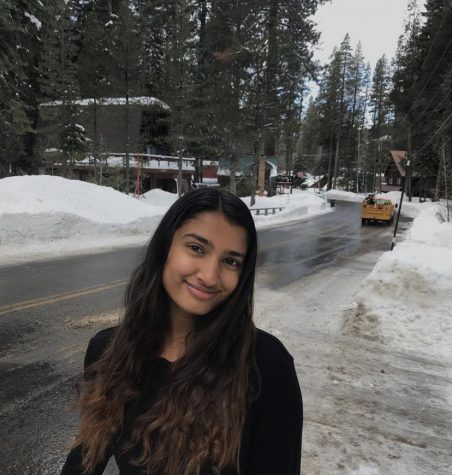
The Catalyst (TC): What does seeing a woman and person of color in the vice presidential office mean to you?
Nieve Dandekar (ND): I am really happy to see a woman who is half South Asian in office. I feel like I will be able to relate to her and identify with her. I feel as though those who look like me will feel represented and heard by those in power. I am really inspired by her, and I look forward to seeing what she will do in the future.
TC: What do you think is the value of representation of both gender and race in government positions?
ND: I think that now more than ever we need people in government positions who can represent race as well as gender. I believe that our government needs to be a reflection of the way our country looks. I hope that we continue to elect people from all walks of life into office so that everyone feels represented and cared for.
TC: At the end of her acceptance speech, Kamala Harris said that she would not be the last woman in this office. Do you find that these words and her achievements are inspiring to women to pursue leadership positions?
ND: I really like the fact that she ended her speech on a powerful note because I think that she will inspire girls all over the U.S. and the world to follow their dreams to work in the government. She shows girls everywhere that they will be able to make a change in society if they are really passionate about it.
TC: Do you think that a woman will bring new perspectives to the ways that things are managed or governed?
ND: I think that a woman will definitely bring new perspectives that a woman can bring to the table. I hope that she can represent us when it comes to our rights regarding our bodies and our decisions. I also hope that she is able to represent us with equal pay and all of the other inequalities that women face on a daily basis.
TC: If you had been able to vote, do you think that the fact that a woman was on the ballot would have influenced your voting decisions one way or another?
ND: I would have treated a woman on the ballot the same way that I would treat a man. Just because she was a woman I would not have voted for her. I would have taken the time to understand her policies and plans for the country. I think I would have to make sure that she would make it her responsibility to represent us fairly.
Wendy Connolly, history teacher
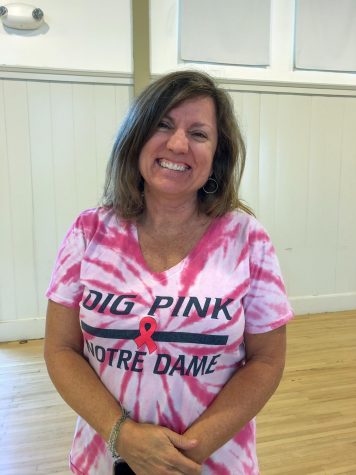
The Catalyst (TC): What does seeing a woman and a person of color in the vice presidential office mean to you?
Wendy Connolly (WC): For my thesis for my master’s, which I submitted, almost a year ago, it was giving a voice to enslaved women, and so I spent a good three-four years researching about enslaved women. There’s a lot of information on enslaved men, but not on women; women’s voices have been lost to history. And so one of my goals was to find their voice again. Fast forward to 2020, to see that we can move forward, that we can get past our racial divide and vote in anyone of color. I wouldn’t even define a color or skin type. It’s just that we can have people that can do the job right, that’s all that should be the requirement.
TC: What do you think is the value of representation of both gender and race in government positions?
WC: We’ve had white landowning men running this country for over 200 years, and that is not a representation of who this country is anymore, or wasn’t even then. But women have struggled, all the way back, with Abigail Adams, Remember the lady’s, I don’t think she was really asking for the right to vote, but she was asking for protections so that women could do whatever it is that they needed to do without fear of reprisal. So the fact that we can have representation, won’t it be refreshing to see what will happen with women in leadership now? We don’t know because we have never been given a chance, but to have a female vice president to have a female president, I’m interested to see what’s going to be different. A lot of times in government, our hands are tied with politics and it doesn’t matter who you are, you can’t seem to get anything through, so I will be refreshed to see what she does, though I feel for her, she’s got a tough, difficult road ahead of her because she is forging a path that no one has been able to forge through so that that’s going to be tough.
TC: Do you think that a woman will be able to bring new perspectives to the way that things are governed?
WC: Yes, I do. Absolutely. And I think that women do, I mean, there are gender norms and stereotypes or whatever, but women do look at things differently, I mean genetically we are different. And we don’t know yet what those perspectives will be, we’ve had women and you know Hillary Clinton was Secretary of State. So we’ve seen some differences but never this high level, and even filtering down to setting the tone for girls. I remember there was a picture I saw of a young girl, like five or six, and a girl of color and she was wearing a T shirt that said something like, she’s just like me, it was basically just saying, I can be vice president too. And that is a huge change.
TC: At the end of her acceptance speech, Kamala Harris said that she would not be the last woman in the office. And do you think that her words and her achievements will be inspiring to other young women to pursue leadership positions?
WC: Yeah, absolutely, I mean already these girls that never thought that they could go that far and not even just being president, even vice president, but looking at corporations companies. It is empowering and it’s about darn time. What has been our problem, why is it that women have had to fight so hard to overcome so many obstacles, clawing our way? It’s about time and I think it will be empowering. She is so articulate, so thoughtful, I mean I don’t care what political party you are, just looking at Kamala the woman, she is so articulate and so educated, I mean wicked smart, she is going to forge a new path, just based on who she is and just how smart she is, so she’s hopefully going to open that door for others.
TC: For a long time the subject of US history has been mainly focused around the stories of men. How do you think that this event will change that?
WC: Well I mean already her story’s been told, you know, I knew who Kamala Harris was because she was a senator from California, and she was district attorney of San Francisco. But I didn’t know much more of her than that. Mainly because I didn’t choose to find out. And that’s on me. But now that she is out there, she’s filling so many firsts that her story is being told, and people like Stacey Abrams, who is coming into the forefront and her story. Having started my dive into enslaved women, and looking at 16th, 17th, 18th century enslaved women, there was one professor at Rutgers, and there was one or two books, she’s the only professor that I found five years ago who was talking about enslaved women and African American women’s history, and there was only a smattering of books that she wrote. My paper was one of the first of a few that was talking about enslaved women and now, they’re coming out in droves there’s so many more professors and even in the next five years. Just getting women of color their voices heard from history, as opposed to, you know, no offense and I respect Harriet Tubman but that’s kind of the one woman that you look at and beyond that, it’s men that you focus on. So I think Kamala will bring renewed energy and attention to women in history.

Peyton Daley is a senior and this is her third year as a Catalyst writer. She served as Arts & Life Editor her sophomore year and Managing Editor her...

